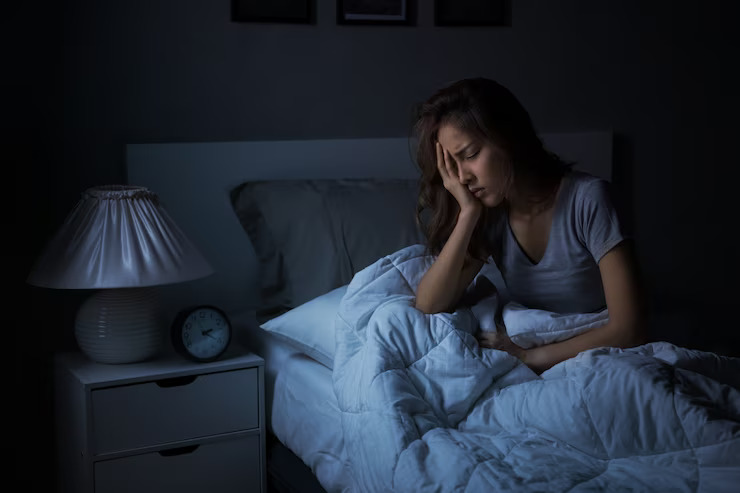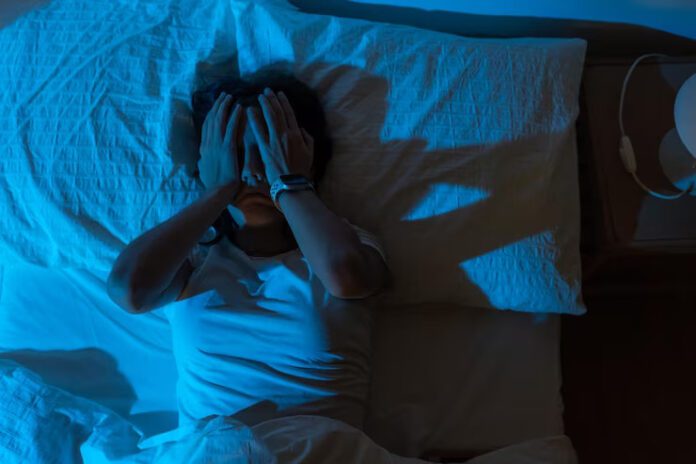Bad Sleep: Sleep is something that we all need to function correctly. However, getting a good night’s sleep can be a real challenge for some of us. If you’re one of those who have trouble sleeping, you’re not alone. In fact, according to the National Sleep Foundation, up to 30% of adults have difficulty sleeping.
There are several reasons why someone might have trouble sleeping. It could be due to stress, anxiety, or an underlying medical condition. If you’re having trouble sleeping, you must talk to your doctor to rule out potential medical causes.
Once you’ve ruled out any medical causes, there are several things you can do to help yourself sleep better. Here are a few tips:
Establish a regular sleep schedule.
Your body thrives on routine. Suppose you can go to bed and wake up simultaneously each day. This will aid in establishing a normal sleep cycle in your body.
Create a relaxing bedtime routine.
Your bedtime routine should relax and help you wind down for the evening. This could involve taking a warm bath, reading a book, or listening to calming music.
Avoid caffeine and alcohol before bed.
Caffeine and alcohol can both interfere with sleep. If you’re having trouble sleeping, avoid caffeine for at least six hours before bedtime and avoid alcohol for at least four hours before bedtime.
Don’t use electronics or work when in bed.
A place for rest and sleep should be your bed. If you’re working or using electronic devices in bed, your brain will associate your bed with being awake and alert. Sleeping may become more challenging as a result.
Throughout the day, stand up and move about.
Exercise can help improve your sleep. Just be sure to avoid exercising too close to bedtime, as this can make it more difficult to fall asleep.
Practice some relaxation techniques.
Several relaxation techniques can help you fall asleep. Some of these include deep breathing, progressive muscle relaxation, and visualization.
What is terrible sleep?
We all know the feeling of tossing and turning all night, unable to get a good night’s sleep. Maybe it’s because we had caffeine too late in the day, or we’re anxious about an upcoming presentation. Whatever the reason, insufficient sleep is frustrating, and it can take a toll on our energy levels, mood, and overall health.
There are a few different types of insufficient sleep. The first is insomnia when you have difficulty falling or staying asleep. Stress, anxiety, depression, drugs, and other medical issues may all contribute to insomnia. If you have insomnia, you might wake up several times during the night or early in the morning and cannot fall back asleep.

The second type of insufficient sleep is called sleep apnea. This is when you stop breathing for short periods during the night. Sleep apnea can be caused by a blockage in your airway or by your nervous system not sending the correct signals to your muscles to keep your airway open. Sleep apnea can lead to snoring, gasping for air, and waking up tired.
The third type of insufficient sleep is called restless leg syndrome (RLS). This is when you are urged to move your legs, usually because they feel uncomfortable or tingly. RLS can make it hard to fall asleep and can cause you to wake up during the night.
You may try a few different things to try to get more rest:
- Try to stick to a regular sleep schedule. Even on the weekends, set a consistent wake-up and bedtime.
- Create a relaxing bedtime routine. This might include relaxing in the bath or reading.
- Create a sleep environment that is dark, quiet, and cool.
- Avoid caffeine and alcohol before bed.
- Consult your doctor if you are having sleep issues.
They may suggest possible treatments and assist you in determining the source of your sleep issues.
The Effects of bad sleep
We are all aware of how crucial a restful night’s sleep is. But what happens when you don’t get enough sleep or when the quality of your sleep is poor? In this blog post, we will explore the effects of insufficient sleep and what you can do to get the rest you need.
Poor sleep can have several adverse effects on your health. One of the consequences is weight gain. This is because lack of sleep causes your body to manufacture more ghrelin, a hormone that makes you more ravenous. Not getting enough sleep can also lead to insulin resistance, a precursor to type 2 diabetes.
Poor sleep can also hurt your mental health. It can increase your risk of anxiety and depression and impair your ability to focus and concentrate. You must talk to your doctor if you struggle to get enough sleep. They can help you identify any underlying health conditions causing your sleep problems and offer treatment options.
How to deal with bad sleep
Everyone is aware of how critical sleep is to our overall health and wellbeing. But sometimes, no matter how hard we try, we can’t get a good night’s sleep. If you’re dealing with insufficient sleep regularly, it can be highly frustrating and affect your mental and physical health.
Several things can cause bad sleep, such as stress, anxiety, certain medications, and sleep disorders. If you struggle to sleep well, consult your doctor to rule out any underlying health conditions.
You can also do a few things at home to help improve your sleep. Creating a bedtime routine and sticking to it can help your body know when to wind down for the night. You can get better sleep by avoiding coffee and alcohol before bed. And making sure your bedroom is dark, quiet, and comfortable can create the ideal environment for sleep.
If you’re still struggling to sleep well, you can try a few other things. For some people, melatonin pills may be beneficial. And if you have severe insomnia, your doctor may prescribe medication to help you sleep.
Dealing with bad sleep can be difficult, but there are things you can do to help improve your sleep. If you struggle to sleep well, talk to your doctor to rule out any underlying health conditions and explore other treatment options.
Sleep Soundly: a guide for dealing with bad sleep.
Most people experience occasional periods of bad sleep. This can be caused by stress, a change in routine, or other factors. There are a few things you may do to aid in getting a good night’s rest.
First, try to establish a regular sleep schedule. Every day, including on the weekends, go to bed and get up simultaneously. This will assist in controlling your body’s natural circadian rhythm.
Second, create a relaxing bedtime routine. This might entail stretching, having a warm bath, or reading a book. Do whatever helps you to wind down and feel ready for sleep.
Third, create a sleep-friendly environment in your bedroom. Make sure the space is quiet, dark, and comfortable. Remove any electronics from the room, as they can be distracting or disruptive.
Fourth, avoid caffeine and alcohol before bed. Both of these substances can interfere with sleep. Caffeine should be avoided for at least six hours before bed, while alcohol should be limited to one drink.
Talk to your doctor if you continue to have trouble falling asleep. Your difficulties sleeping might be brought on by a medical ailment that is underlying. Treating the underlying disease can help you to sleep soundly through the night.
Conclusion
If you’re struggling with bad sleep, there are a few things you can do to improve the situation:
- Make sure your bedroom is as cozy and tranquil as you can make it. This entails maintaining peace, calm, and comfort in the space.
- Make sure to keep to a regular sleep pattern as much as you can. This means going to bed, waking up at the same time each day, and avoiding naps.
- Avoid caffeine and alcohol before bed, and make sure you’re getting enough exercise during the day.
If you follow these tips, you should start seeing an improvement in your sleep quality.

